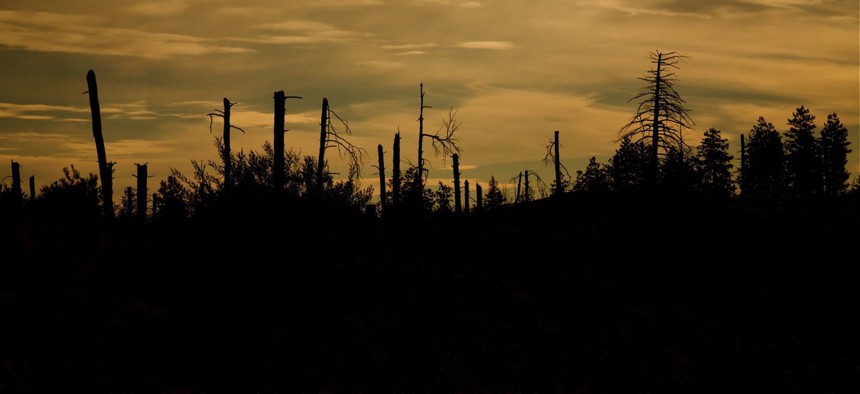Wildfires Burning Through Cash as Fast as Forest; Shell Oil Quits Arctic Seas

Conifer trees post-wildfire. Tom Reichner / Shutterstock.com

Connecting state and local government leaders
Also: Delaware brings private sector advisors in on budget planning and a Justice Department case that’s really not at all about polygamy in Utah.
Here’s some of what we’ve been reading today…
BOISE, Idaho: Wildfires in the Western United States have blazed through forest almost as fast as they have burned through federal and state firefighting budgets. How we fight them and how we pay for them has to change, reports the Idaho Statesman. Only 2 percent of fires account for 97 percent of firefighting costs. They’re the fires that escape containment and burn in areas rich with fuel, and they can be better prevented than they are being today. Foresters say the answer is to log forests and conduct more prescribed burns. But logging national forests is controversial, and the public still hates prescribed burns, making the cost of error very high in the worlds of politics and public relations. But foresters say half a billion dollars spent on thinning and prescribed burning would save billions in firefighting costs, to say nothing of property loss, so the time to act is now:
Since the 1980s, the incidence of large wildfires has grown by four times and the length of fire season has risen 64 percent, the U.S. Forest Service said. The federal cost of firefighting has risen from $600 million in 1995 to a high of $3 billion in 2014. State expenditures have doubled since 1998 to $1.6 billion… Annual firefighting costs will average nearly $1.8 billion by 2026, up from an average of $1 billion in 2013. “That’s going to overwhelm everything we’re trying to do,” said John Freemuth, a Boise State University professor specializing in public land policy.
Julian Morris, vice president of research at the libertarian Reason Foundation, says change won’t come easy. “Employees of federal agencies seek to protect their jobs. Homeowners and business in forested areas demand ‘protection’ from fires. And environmental activists vigorously oppose a resumption of logging.” [The Idaho Statesman]
JUNEAU, Alaska: Not with a bang but a whimper … After spending a decade and $7 billion lobbying lawmakers and beating back environmentalists and after woefully struggling to navigate dark icy waters, Shell Oil at last managed to drill a well in the Chukchi Sea in the Arctic Circle north of Alaska, but that well produced “no meaningful quantities of oil or gas,” reports Bloomberg Business. The company has announced it is abandoning exploration in the U.S. Arctic. Shares fell 1.4 percent in the wake of the announcement. News from Alaska has rarely been good for Shell in recent years. In 2012, the company sought to avoid an Alaska state tax by moving the Kulluk, its main drilling rig in the region, to out-of-state waters. But the seas turned stormy and the rig ran aground, costing the company public embarrassment and millions of dollars in repairs. [BloombergBusiness]
DOVER, Delaware: Republicans in the minority party in the state have been pushing for months to create a new “spending committee” at the Legislative Hall to review budget line items and seek to make cuts. They said they “weren’t getting a fair shake,” in the legislature, reports Delaware State News. Democrats in the majority have resisted, saying there’s a reason Republicans are the minority party and that a new committee would be redundant. But Democratic Gov. Jack Markell relented, announcing last week that he would form the new “Delaware Expenditure Review Committee” by executive order. The committee will include 12 men and women, many from the business community, and no lawmakers. “Our revenue sources don’t grow with our economy, so even as our state’s economy has improved, we face tremendous budget challenges,” said Markell. “We have produced the least amount of budget growth during any administration—Republican or Democrat—in modern history. We must remain open to evaluating new ideas, and I look forward to partnering with the private sector to continue this effort.” [Delaware State News]
SALT LAKE CITY, Utah: Lawyers in a case pitting the U.S. Justice Department against the towns of Hildale, Utah, and Colorado City, Arizona, are battling over whether, in making their arguments, they can discuss the practices of polygamy and “underage marriage,” reports The Salt Lake Tribune’s polygamy blog. The Justice Department is arguing a civil rights case on behalf of residents of the towns who say they are being discriminated against by authorities, who they allege are in cahoots with local leaders of the Fundamentalist Church of Jesus Christ of Latter-Day Saints. Lawyers for the towns say discussion of the two topics would be “irrelevant, unfairly prejudicial, and an improper use of a witness' religious beliefs to attack their credibility." [The Salt Lake Tribune]
MONTGOMERY, Alabama: The “Heart of Dixie” is looking to make its roads more bicycle and pedestrian friendly. State officials are asking for public input to update a five-year-old transportation plan originally formulated in response to a federal government requirement, reports the Montgomery Advertiser. Jeff Feet, president of the Montgomery Bicycle Club and the Alabama Bicycle Coalition, who serves on the advisory committee for the plan, is very excited. “For a very nominal expenditure, ALDOT could produce very effective education programs aimed at motorists and cyclists, including (public service announcements), financial support for hands-on education programs at the local and neighborhood levels, and ALDOT could significantly assist with bicycle tourism infrastructure... all at a very low cost,” he said. [Montgomery Advertiser]
John Tomasic is a journalist who lives in Boulder, Colorado.

NEXT STORY: Charlotte readies CRM for customer service boom




